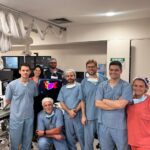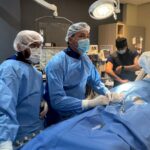Um grupo de engenheiros da Universidade da Califórnia, em San Diego, obteve sucesso no desenvolvimento do primeiro sistema de ultrassom portátil, totalmente integrado, capaz de monitorar tecidos profundos, inclusive em indivíduos em movimento.
Essa inovação tem potencial para desempenhar um papel crucial no monitoramento da saúde cardiovascular e representa um marco significativo para um dos principais laboratórios especializados em tecnologia de ultrassom vestível. Os resultados dessa pesquisa foram recentemente publicados na revista Nature Biotechnology.
O trabalho foi liderado pelo laboratório de Sheng Xu, professor de nanoengenharia na UC San Diego Jacobs School of Engineering e autor correspondente do estudo.
O sistema ultrassônico vestível autônomo totalmente integrado (USoP) baseia-se em pesquisas anteriores do laboratório sobre o design de sensores ultrassônicos flexíveis. Contudo, ao contrário dos sensores anteriores, que requeriam cabos para transmitir dados e energia, o novo sistema incorpora um circuito de controle pequeno e flexível que se comunica com uma matriz de transdutores de ultrassom, permitindo a coleta e transmissão de dados sem fio. Um componente de aprendizado de máquina auxilia na interpretação dos dados e no rastreamento de sujeitos em movimento.
Conforme apontado pelas descobertas do laboratório, o sistema ultrassônico em forma de patch possibilita o rastreamento contínuo de sinais fisiológicos de tecidos profundos, alcançando até 164 mm de profundidade. Ele é capaz de medir continuamente a pressão arterial central, frequência cardíaca, débito cardíaco e outros sinais fisiológicos por até doze horas seguidas.
A USoP também representa um avanço significativo no desenvolvimento da Internet das Coisas Médicas (IoMT), que consiste em uma rede de dispositivos médicos conectados à internet, transmitindo sinais fisiológicos sem fio para análise, computação e diagnósticos profissionais na nuvem.






